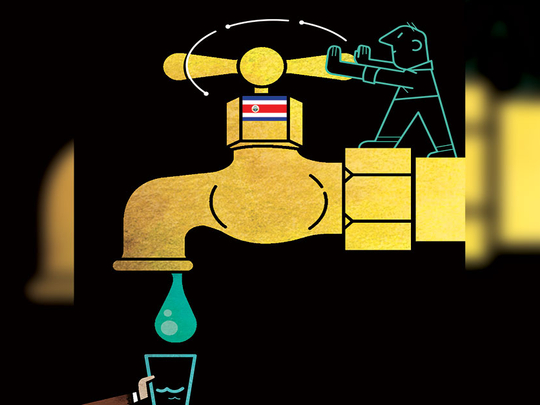
In Costa Rica, the demand for water is nearing the country’s total production capacity, generating fears of a water deficit. In the city of Belén, households consume more water per day than recommended by officials. Rather than increase prices to reduce usage, the authorities decided to use behavioural interventions to supplement traditional policy approaches.
All water bills started to compare usage to the average neighbourhood household. Consumption soon fell by between 3.5-5.6 per cent.
Any proven way to reduce water consumption will be important for the GCC. Projections from the World Resources Institute suggest that the region could experience extremely high water stress within decades. Meanwhile, its usage of utilities generally, and its pollution levels, are among the highest in the world.
The GCC is responding to these challenges, raising utility tariffs and promoting the use of smart meters, while making substantial investments in plans for renewable energy.
The story from Costa Rica, however, demonstrates that other initiatives can complement ongoing policy reforms in a powerful way. As they seek to get consumers to use utilities more efficiently and promote environmental sustainability, policymakers could turn to a broad range of simple, low-cost behavioural interventions.
Often called nudges, these can help to maximise the impact of this investment. Indeed, GCC governments can pick many useful lessons from recent research into the benefits of these interventions around the world.
Policies are generally designed on the basis that human beings make rational choices that lead to the best possible outcome. Yet if that were the case, people would not drive carelessly or smoke. In reality, certain biases can lead people to make decisions that are not necessarily in their self-interest.
For example, this could be a present bias, the tendency of people to pay greater attention to more immediate payoffs. This particular bias may deter consumers from purchasing energy-efficient light bulbs due to the higher initial outlay, even if their overall long-term cost is likely to be lower.
Alternatively, the natural desire to conform with peers can be a powerful force. In Costa Rica, water consumers appeared to care more about what their neighbours were doing than the size of their own bill.
It is not surprising that governments everywhere are incorporating such behavioural insights into their policy armoury. The resulting nudges are often successful and cheap to implement. Importantly, they leave individuals with freedom of choice, merely encouraging them in certain directions by expanding their range of options.
The natural competitive instinct applies to groups as well as individual households. In the Energy Neighbourhood Project, conducted in several European countries, teams composed of several households appeared to be highly motivated to keep pace with, or outdo, rivals.
Some eight to 12 households formed a team, the so-called ‘Energy Neighbourhood’, which then competed with other teams to determine which saves more energy. If a particular team saved at least 8 per cent of energy compared to the previous bill period, their particular municipality awarded that team a prize.
Almost 6,000 households from nine different countries participated. The teams achieved an average energy saving of 10 per cent. The winning team from Sweden even managed a saving of 37 per cent through simple measures such as using energy-saving lamps, and disabling standby on their appliances.
Project Sunroof, devised by Google, makes use of what might be termed ‘the hassle bias’, the tendency to avoid onerous tasks instead take an easier route. The goal of the scheme is to encourage households to purchase solar panels by reducing the inconvenience of complex planning and calculations.
The programme first uses Google Earth imagery to analyse the shape of the roof in question, and local weather patterns, to create a personalised solar plan. Based on this analysis, Project Sunroof then suggests the recommended number of solar panels, and provides prospective buyers with an estimate of potential savings and various financing options.
There are many similar ways to use behavioural insights to optimise energy and water consumption. The government should begin by building the core behavioural capabilities. The authorities should then pilot high-impact interventions and measure their impact.
This involves clearly defining the problem and so grasping its behavioural causes through the use of an in-depth survey. An intervention that seeks to address these causes can then be put into practice, with its impact measured in an initial experiment. If successful, the government can implement a large-scale roll-out of the plan.
Along with significant policy reforms and investment in renewable energy, GCC governments should introduce behavioural interventions to promote environmental protection and sustainable development. Through the astute use of nudges, they can extract the maximum possible value from this investment.
Yahya Anouti is principal at Strategy& Middle East, part of the PwC network. Alice Klat is director of the Ideation Center at Strategy& Middle East.











